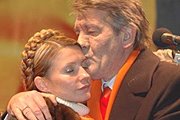 On Wednesday, news broke that a new orange coalition government is forming in Ukraine. Both president Yushchenko's Our Ukraine and the Timoshenko bloc (BYuT) confirmed that an agreement had been reached. The news comes amid rumours that Yushchenko was teaming up with orange revolution enemy Yanukovich and his Party of Regions.
On Wednesday, news broke that a new orange coalition government is forming in Ukraine. Both president Yushchenko's Our Ukraine and the Timoshenko bloc (BYuT) confirmed that an agreement had been reached. The news comes amid rumours that Yushchenko was teaming up with orange revolution enemy Yanukovich and his Party of Regions.
If the deal goes through, Yulia Timoshenko will once more become Prime Minister, which has been her primary goal since she was sacked from the post last September. The coalition will be between
Our Ukraine,
BYuT, and the
Socialist Party, which has been the main negotiating approach all along.
Indeed, negotiations to form a coalition between
Our Ukraine,
BYuT, and the
Socialist Party, have been underway ever since the 26 March parliamentary elections. At the beginning of April,
Our Ukraine announced that unity had been reached. Then, nothing happened. In mid-May, it was
Timoshenko's turn to declare that a new government had been agreed on. Once again, nothing happened. So, one might well perceive news from Kiev on a new cabinet with sound skepticism, were it not for a constitutional deadline on forming a government. Therefore, it now appears that Ukraine will eventually get out of its post-election political deadlock. However, as
BBC's Kiev correspondent states, "The deal will not be certain until it is signed."
If the deal goes through,
BYuT is said to receive a dominant 11 cabinet posts, including the Premiership.
Our Ukraine will get the post as speaker of the Parliament, and has already nominated Petro Poroshenko. The
Socialist Party will appoint the vice-Premier.
By all appearances, Ukraine will be in for a tough political ride with its new cabinet. Neither president Yushchenko nor Poroshenko stand Timoshenko, since the fall-out and scandals leading to Timoshenko's dismissal as Premier last September.
Moreover, constitutional changes this year weaken the presidential powers to the benefit of parliament - the
Verkhovna Rada. The
Rada has a long tradition of relative independence, playing its role in the political balance of power, and party allegiance is far from granted. With fiery and controversial Yulia Timoshenko as Premier, parliament may decide to get in the way of her plans at leisure.
However, there is one strong binding-force uniting the new government. The political forces of the Orange Revolution has failed once. This time they have to succeed or face total political discredit for the foreseeable future. Thus, as Ukrainian political analyst, Volodymyr Fesenko, put it to
AFP: "It's a second chance and if they fail, they'll all go down together."
Turning to Ukraine's international relations, with Timoshenko as Prime Minister, relations with Russia are in obvious jeopardy. Already the same day that the new coalition was announced, Timoshenko called for a review of the Russian-Ukrainian gas deal that ended the New Year's gas crisis earlier this year,
BBC reports.
In addition to this, the US Marine Corps participated in exercises on the Crimean peninsula a few weeks ago, which sparked fears in Moscow of Ukrainian ambitions to join Nato. Thus, Russian foreign minister
Sergei Lavrov warned Ukraine that such a move would seriously hurt relations Moscow and Kiev.
The majority of Crimeans are ehtnic Russians, and the Black Sea peninsula was transferred from Russia to Ukraine as late as in 1954 by Soviet leader Nikita Khrushchev. Therefore, the presence of US troops in a disputed Ukrainian region does not serve to improve Ukrainian relations with Russia. Indeed, the government that is now being formed will inevitably have to meet major challenges in its relations with the Kremlin.
 Chicken race was a perilous game among youngsters in the US during the 1950s, said to originate from East European immigrants. The game models two car drivers, both headed towards each other at high speed. The first to swerve away yields to the other. If neither player swerves, the result is a potentially fatal head-on collision.
Chicken race was a perilous game among youngsters in the US during the 1950s, said to originate from East European immigrants. The game models two car drivers, both headed towards each other at high speed. The first to swerve away yields to the other. If neither player swerves, the result is a potentially fatal head-on collision.








